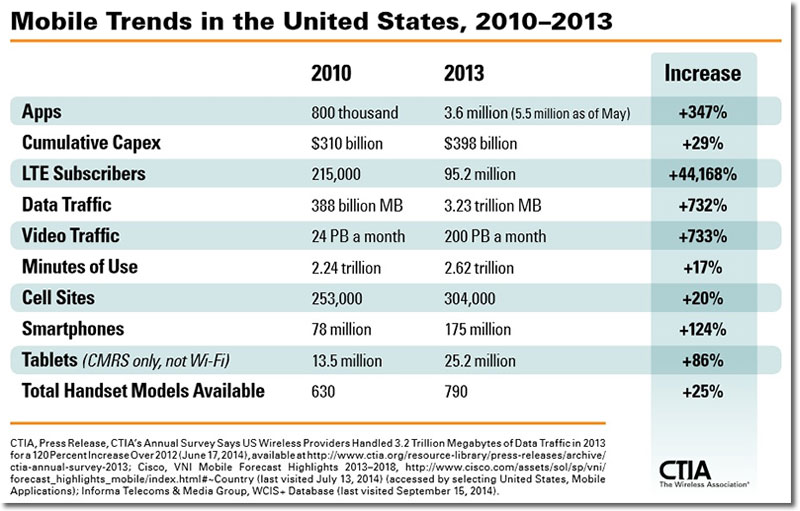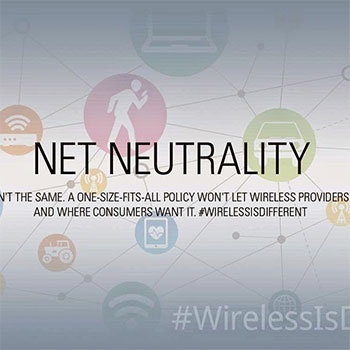Net Neutrality: The Difference Between Wired & Wireless Explained

Wired and wireless aren't the same, and a one-size-fits-all policy won't let wireless providers deliver content when and where consumers want it.

Key Points
- The U.S. wireless industry remains committed to an open Internet and to delivering consumers with world-leading mobile broadband networks.
- Recognizing the unique technical, competitive and market attributes of mobile broadband, the Federal Communications Commission (FCC) applied a mobile-specific, Title I approach to its Open Internet rules in 2010. Thanks to this decision to apply a light regulatory touch Americans enjoy the world’s best wireless industry, from networks to devices to apps.
- In order to continue to provide Americans with increasingly faster speeds and mobile Internet access anytime and anywhere, wireless providers must have the flexibility to manage mobile networks so that all users enjoy the highest quality service experience.
- Mobile broadband providers face unique technical challenges, including limited spectrum resources, varying numbers of users at any one time, differing handsets with differing capabilities, differing spectrum bands and differing technology platforms and each user’s constantly changing channel conditions, to name a few. These challenges demand far more complex and aggressive network management than fixed broadband requires.
- The mobile broadband market is fiercely competitive, with providers introducing ever more innovative mobile broadband product offerings. The record shows that Internet openness is essential for any carrier seeking to win and keep customers, and that differentiation in service – far from weakening the Open Internet – benefits consumers.
- Any Open Internet regulation must steer clear of antiquated common carrier regulation, which would jeopardize mobile broadband’s dynamism and the investment and innovation which characterizes the U.S. mobile ecosystem today. The FCC, on a bipartisan basis, rejected previous calls in 2007 and 2010 to regulate mobile broadband as a utility (Title II).
- If the FCC chooses to classify broadband as a Title II public utility, it would have potentially devastating impact on Americans and the U.S. economy. Imposing Title II on wireless would be a gross overreaction that would interrupt the world’s best wireless industry, and interfere with the significant innovations and competition consumers enjoy today.
CTIA Position
CTIA and its members support keeping the Internet open. The best way to ensure that U.S. consumers continue to enjoy this vibrant and world leading ecosystem is to recognize that “wireless is different” and maintain a mobile-specific, Title I approach to Open Internet rules.
Thanks to the current light regulatory touch, which the bipartisan FCC wisely voted to keep in 2007 and 2010, every part of the U.S. wireless industry ecosystem has thrived and is benefiting consumers.

In adopting its current approach, the FCC wisely rejected the calls of a few who called for mobile broadband to be regulated as a public utility. The world-leading success of the U.S. wireless ecosystem is testament to the merits of this approach.
Due to their reliance on spectrum and the need to provide ever more bandwidth intensive services to a mobile user base, wireless networks have a number of challenges that require constant management by engineers so that all users have the best possible mobile experience possible. A recent white paper by well-respected engineers explains some of the technical factors that affect mobile broadband networks, including:
- how mobile broadband providers apply differential treatment to different traffic streams on a real-time, dynamic basis in order maximize the experience of their consumers overall;
- the stark technological differences between wireless and wireline networks and network management; and
- the problems that would arise from imposing expanded and prescriptive Open Internet regulation on mobile broadband providers.
Some claimed that even if wireless is different, these differences can be accommodated through a “reasonable network management” exception to the FCC’s Open Internet Rules, but this argument ignores the fundamental realities of mobile wireless network management. In mobile wireless, the exception is the rule: mobile broadband providers need flexibility to continuously manage their networks and to ensure that consumers receive access to the services they expect and experience today.
From a marketplace standpoint, too, the mobile broadband ecosystem is different from other forms of broadband. While 85 percent of U.S. homes have at most two wired broadband providers, 82 percent of Americans are served by four or more mobile broadband providers (and 92 percent are served by three or more). The result is a thriving, competitive mobile marketplace, with more choices, innovative options and tremendous value.
The U.S. mobile broadband ecosystem continues to evolve at a stunning pace. Mobile data traffic is expanding at an exponential and accelerating pace, more users continue to adopt mobile services, and more devices are connected to the “Internet of Things.”
If policymakers decide to create rules that ignore these fundamental wireless differences, it will negatively impact not just the U.S. wireless industry but U.S. consumers and businesses. Even regulators from other countries acknowledge that the U.S. is leading the world in wireless:
“…the EU is lagging well behind the U.S. in deployment of next generation wireless infrastructures and the advanced services they make possible, and that EU consumers are worse off as a result.”
Why would anyone think imposing heavy-handed and unnecessary rules makes sense when other countries’ regulators look to the U.S. to try to emulate our success? In wireless, there has not been a single formal complaint filed since the adoption of the FCC’s 2010 Open Internet rules. That is because U.S. providers are motivated to provide an Open Internet not because of rules or court cases, but because that is what consumers demand.
If the FCC chose to reclassify mobile broadband from Title I to the arcane Title II utility rules, it would treat your smartphone or tablet the same as our roads, our electrical grids and our water supply. The mobile industry changed more in the last six months than those industries in the last 60 years, and none of these industries have made anywhere near the innovation or competition that is in the U.S. wireless industry.
Beyond these well-founded policy concerns, reclassifying mobile broadband under Title II would violate the explicit provisions of the Telecommunications Act of 1996. Congress clearly restricted the FCC from subjecting wireless broadband to common carriage regulation and has long called for a mobile-specific approach to regulation in recognition of its differences and consumer benefits.
CTIA and its members urge the Commission to maintain a mobile-specific, Title I regulatory framework that will foster continued growth and innovation. Wireless is different, and a regulatory framework that will promote our mobile lifestyles needs to reflect this.
Related: FCC Chairman’s Net Neutrality Plan Turns Broadband into a Public Utility

Article Topics
CTIA News & Resources
U.S. Court Backs Landmark Obama Internet Equal-Access Rules - Net Neutrality Upheld Microsoft and Facebook to Build Massive Internet Cable across the Atlantic Comcast Folds - But No Dancing In the Streets Yet Why America’s Internet Is So Slow and Broken Net Neutrality and Technical Challenges of Mobile Broadband Networks Net Neutrality: The Difference Between Wired & Wireless Explained FCC Chairman’s Net Neutrality Plan Turns Broadband into a Public Utility More CTIALatest in Technology
Spotlight Startup: Cart.com is Reimagining Logistics Walmart and Swisslog Expand Partnership with New Texas Facility Taking Stock of Today’s Robotics Market and What the Future Holds Biden Gives Samsung $6.4 Billion For Texas Semiconductor Plants Apple Overtaken as World’s Largest Phone Seller Walmart Unleashes Autonomous Lift Trucks at Four High-Tech DCs Talking Supply Chain: Procurement and the AI revolution More Technology












